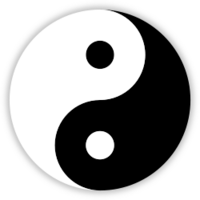Perception of interdependent opposites: Difference between revisions
>Josikins Grammatics |
>Josikins simplified the language so that the description is considerably more understandable |
||
| Line 1: | Line 1: | ||
<onlyinclude> | <onlyinclude> | ||
[[File:Yinyang2.png|200px|thumbnail|right|In Chinese philosophy, [http://en.wikipedia.org/wiki/Yin_and_yang yin and yang], are concepts used to describe how opposite or contrary forces are actually complementary, interconnected and interdependent in the natural world.]] | [[File:Yinyang2.png|200px|thumbnail|right|In Chinese philosophy, [http://en.wikipedia.org/wiki/Yin_and_yang yin and yang], are concepts used to describe how opposite or contrary forces are actually complementary, interconnected and interdependent in the natural world.]] | ||
'''Perception of interdependent opposites''' is a state of mind that often accompanies [[ego death]] levels of [[memory suppression]]. It can be described as a powerful sensation in which one feels as if they can understand and | '''Perception of interdependent opposites''' is a state of mind that often accompanies [[ego death]] levels of [[memory suppression]]. It can be described as a powerful sensation in which one feels as if they can understand and feel that reality is based upon a system in which the existence of many fundamentally important concepts or situations logically arise from and depend upon the co-existence of their opposite. | ||
This experience is usually | This experience is usually interpreted as providing deep insight into the fundamental nature of reality. For example, concepts such as ''existence and nonexistence, life and death, up and down, self and other, light and dark, good and bad, big and small, pleasure and suffering, yes and no, internal and external, hot and cold, young and old, etc'' each feel as if they exist as states of harmonious and necessary contrast to their opposite force. | ||
</onlyinclude> | </onlyinclude> | ||
===Psychoactive substances=== | ===Psychoactive substances=== | ||
Revision as of 02:21, 29 December 2017

Perception of interdependent opposites is a state of mind that often accompanies ego death levels of memory suppression. It can be described as a powerful sensation in which one feels as if they can understand and feel that reality is based upon a system in which the existence of many fundamentally important concepts or situations logically arise from and depend upon the co-existence of their opposite.
This experience is usually interpreted as providing deep insight into the fundamental nature of reality. For example, concepts such as existence and nonexistence, life and death, up and down, self and other, light and dark, good and bad, big and small, pleasure and suffering, yes and no, internal and external, hot and cold, young and old, etc each feel as if they exist as states of harmonious and necessary contrast to their opposite force.
Psychoactive substances
Compounds within our psychoactive substance index which may cause this effect include:
Experience reports
Anecdotal reports which describe this effect within our experience index include:
- Experience:150mg MDMA + 20mg 2C-B - I designed it this way myself
- Experience:2.5g Psilocybe Cubensis B+ strain - epiphany of nondualistic reality
- Experience:20mg - A profound sense of oneness
- Experience:80mg - progressing deeper into states of unity and interconnectedness
- Experience:Unknown Dose DOC (Insufflated) - Overdosing and Terifying Ego Death
- Experience:Unknown dosage / 3 tabs - Ego death and a total break through in the snow
See also
- Responsible use
- Tao Te Ching
- Tally Hall - & (YouTube)
- Subjective effects index
- Psychedelics - Subjective effects
- Dissociatives - Subjective effects
- Deliriants - Subjective effects
External links